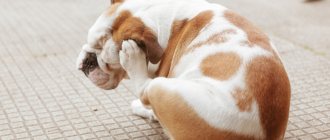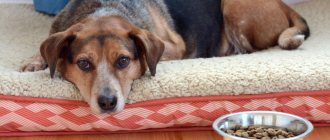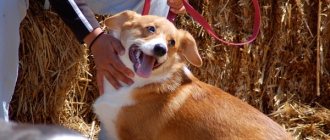Most dogs have a good appetite. Refusal of your favorite food is a signal to the owner that you need to closely monitor the pet’s further eating behavior. True, among dogs there are also those who by nature are small-fed and capricious in food. Therefore, not any refusal to eat should cause panic. From the article you will learn in which cases you should immediately contact a veterinarian to find out the cause of the “hunger strike,” and when you can let go of the situation and observe a little.
Reasons why a dog refuses food
First of all, it is worth finding out whether the dog maintains normal activity, or whether he is lethargic and refuses even treats.
While remaining active
An active animal almost never refuses food or treats, even in the absence of hunger.
Possible reasons for refusing to eat while maintaining active behavior:
- intensive growth. The question often arises: why does a healthy puppy refuse to eat? If your baby misses one or two meals, it’s okay. It grows, the number of necessary feedings gradually decreases;
- picky. This is especially true for miniature breeds, which are often capricious and choose tastier food. By refusing food, such dogs simply expect a more tasty offering;
- serious physical activity. Dogs tend to refuse to eat if they have undergone intense exercise or training the day before;
- influence of hormones. Often in females in heat I ignore the food bowl. The same applies to male dogs if you meet a female in heat while out for a walk;
- stressful situation. Dogs can experience stress from a variety of situations: moving to a new home, traveling by car, going to the vet, staying in a pet hotel for a certain period of time. The dog may refuse both food and water.
- not a suitable menu. A pet, for example, refuses to eat dry food. There may be several reasons: the product has spoiled and is bitter, the diet is simply not to your liking, or the dog is lacking water.
All of the above reasons, provided the dog is active, cannot last long. When replacing food or after some time, the dog will still show interest in the bowl.
The dog is lethargic and does not eat
If the dog becomes more and more lethargic, spends more time in his place, refuses to play and does not happily run for a walk, this is a reason to contact the veterinarian. Although, there are dogs with a phlegmatic temperament, which are absolutely not characterized by jumping and joyfully running around the house. Every owner is able to notice changes in behavior almost immediately; all you have to do is be a little more attentive.
It’s worth doing a test - hand your beloved dog a piece of his favorite treat. If he reaches for food, but at the last moment refuses it, visit the veterinarian immediately. Most likely, he cannot swallow his favorite food due to nausea or injury. Nausea may indicate intoxication of the body and developing diseases.
Important: do not delay visiting the clinic - many diseases develop too quickly and you may simply not have time to provide help.
The main reasons why a dog refuses to eat
Determining why a dog isn't eating is not always easy. This is due to the fact that there are many reasons why a pet does not show interest in food. Reluctance to eat may be a symptom of a serious illness in a dog or may occur as a response to changes in environmental conditions. In addition, the pet may not eat because the food does not suit it.
A dog may refuse food for various reasons.
For your information! What a Shepherd needs won't always benefit a Pug, so it's important to consider the breed when feeding.
The best way to rule out health problems is to contact a veterinarian, who will either confirm that the pet is sick and prescribe treatment, or, if the animal is healthy, suggest what factor could provoke such behavior. When a dog refuses to eat for a long time (more than two days), contacting a doctor cannot be delayed. The sooner the cause is identified, the easier it is to get rid of it and start eating again.
Heat and other external factors
Some dogs are sensitive to climate change and weather outside the window. Often, owners notice that the dog refuses to eat due to the heat. In the summer, when the temperature outside rises, the pet’s body heats up, and the body is forced to spend energy on cooling it. It is important to provide the animal with water, this is what it needs most.
Note! Appetite decreases in summer, the pet may go on a hunger strike or eat small portions. This is normal if a complete refusal to eat does not last for several days.
The same behavior can be observed in winter, especially in severe frost. At the same time, the dog not only eats poorly, but also becomes lethargic, sleeps more often, and rarely plays. Cloudy weather also often affects the condition of the pet.
Psychological problems
If your dog doesn't eat, it may be due to his state of mind. The following factors can affect your pet's appetite:
- moving to a new place of residence (especially typical for puppies);
- unconscious encouragement by the owner (giving out treats when one does not want to eat);
- the use of physical force and the owner’s screams if the animal tries to refuse to eat (the connection between food and punishment is reinforced).
Often the dog is simply capricious, trying to beg a more tasty piece from the owner. This problem can be solved by training and proper education of the dog.
Note! It is important to distinguish whims from your pet’s taste preferences. Just like people, animals have foods they love and hate. If your pet happily eats food with lamb and rabbit, but refuses fish, this is a manifestation of taste preferences. When a dog is not interested in anything other than treats, it begins to beg, these are whims.
Physiological reasons for refusing food
A pet often refuses to eat when there are changes in its body. These include the following circumstances:
- the dog is growing. In the first year of life, your appetite may be unstable, but this is normal. Sometimes the puppy does not have enough daily allowance, and sometimes there is too much food;
- teeth are being cut. A pet aged 3-8 months may lose interest in food due to discomfort in the mouth. At the same time, the puppy may experience lethargy and reluctance to play. Sometimes, to solve the problem, it is enough to temporarily change the feeding format. When the owner sees that the puppy cannot cope with food, it is recommended to rub and chop natural food, and soak the food;
- estrus in females and heat in males. At this time, the reproductive instinct can override all other desires of the pet, and he refuses food. When the difficult period comes to an end, the dog will return to its usual diet.
Important! Loss of appetite may be affected by previous anesthesia. If your pet has recently undergone major surgery, you should not expect it to immediately begin to show interest in food.
Pathological causes of loss of appetite
Often, lack of appetite is one of the symptoms of various diseases. It is worth observing the dog and identifying changes in its behavior. It is necessary to contact a veterinarian and start treating your pet if it:
- feels pain when pressing on the stomach, back, paws, during examination of the mouth;
- often trembles even in hot weather, has convulsions;
- recently suffered from an insect bite;
- hunches his back, has difficulty moving;
- whines frequently;
- behaves aggressively towards the owner and members of his family, although this has not been observed before.
If, in addition to refusing to eat, there are other symptoms, you should consult a doctor
Important! If your pet vomits, this may indicate poisoning or the development of diseases of the gastrointestinal tract. Having noticed any of the listed symptoms in an animal, the owner should immediately show it to a doctor, especially if the dog has not eaten and has been lethargic for several days.
Diseases that cause your pet to refuse to eat
Almost all diseases force the dog to refuse to eat, as they cause pain, fever, and nausea. Some of them can provoke both refusal to eat and excessive appetite against the background of general lethargy. For example, in the case of a helminthic infestation, a dog may eat a lot, but still lose weight.
There is a large group of diseases that can cause a dog to lose his appetite:
- diseases of the mouth (stomatitis, gingivitis, periodontitis, tartar, etc.);
- foreign body in the pharynx or gastrointestinal tract - the situation requires emergency medical intervention. Usually, in such a situation there is no stool and vomiting;
- ear diseases, especially in the acute period;
- problems with the gastrointestinal tract (gastritis, intestinal obstruction, volvulus);
- poisoning;
- injuries that cause severe pain;
- viral and bacterial infections;
- oncological diseases;
- infection by parasites: helminthic infestations, fleas, ticks, lice eaters, etc.;
- diabetes;
- renal, liver failure;
- stress;
- colds. Many owners believe that the animal can easily sleep in a draft and a cold floor and not have colds. This is wrong. If a dog has a cold, he will refuse food, but not water. Without treatment, the disease will lead to complications or death of the pet.
It should be noted that the dog’s stress should go away in a couple of days. If this does not happen, you should consult a doctor to prescribe sedatives or advice on how to mitigate the consequences.
Why did the dog lose his appetite?
As already mentioned, there are a number of diseases that cause reluctance to touch food:
- Problems with teeth or oral cavity - the dog may lose appetite due to inflammation or infection of the gums, a broken tooth, damage to the lining of the mouth, or stones in the teeth.
- Painful sensations – pain provokes the animal to refuse food. Observe your pet's behavior to see if there is lethargy, drowsiness, fever, irritability, stooped posture, fever, or lameness. If there are at least a few signs, then the dog is sick - contact your veterinarian immediately!
- Ear infections – painful sensations from inflammation in the ears can make you reluctant to eat, especially solid foods.
- Diseases of the gastrointestinal tract, such as poisoning, gastritis or stomach ulcers.
- Kidney diseases, which also cause hyperacidity and vomiting.
- Jaundice.
- Plague.
In any of these cases, it is necessary to take the dog to the veterinarian as soon as possible. Only qualified examinations and tests can indicate the true reasons for the lack of appetite in an animal.
What should the owner do?
The main thing is constant observation. It needs to be organized in such a way as to monitor the condition of the animal throughout the day. During this period, it is worth repeatedly offering the dog fresh food; it may be rejected due to spoilage. For example, soaked dry food should not be left in a bowl during the day. Sour pellets cause many animals to stop eating.
Important: you must contact a veterinary clinic no later than 36 hours after an adult dog refuses to eat; for a puppy, this period is 48 hours. These are the extreme recommended time periods. It would be better if the appeal happens even faster.
Owner's observations
When contacting, it is worth helping the veterinarian in collecting data. I arrive at the clinic armed with detailed information about the dog’s condition. For this purpose, records are kept during the observation period, where they include:
- data on diet, selected food;
- presence or absence of vaccinations, recent antiparasitic treatments;
- date and approximate time of the first refusal of a portion;
- information about the dog's refusal of all foods or selective fasting;
- information about the ability to swallow food. At the very beginning of the refusal, offer a treat; here it is important to understand whether the dog has the opportunity to swallow what is offered; there are also difficulties with the process;
- The animal also refuses water or drinks greedily and cannot get drunk;
- observations of the dog's stool: presence or absence, diarrhea, change in color, shape;
- the presence or absence of vomiting or urge. If available, record color, frequency and consistency.
You can remember all the information if you wish, but, most likely, the owner himself will experience stress when visiting a doctor. Therefore, recording observational data is more reliable. Such information will greatly facilitate the process of examination and diagnosis and save valuable time.
First aid
The main assistance should be the timely delivery of the dog to the clinic. If you are sure of the cause of the illness, you can take some measures. For example, in case of poisoning, it is possible to give the dog an antiemetic, sorbents (Enterosgel, Polysorb), antispasmodics (no-spa). Do not forget to warn the specialist about the first aid measures taken, be sure to write down or remember the nuances.
Important: in emergency situations, you have to visit any veterinary clinic where people are unfamiliar with the dog’s health condition and, for example, treatment regimens for chronic diseases. Don't forget to tell your doctor about the medications you are taking, which may cause you to refuse to eat.
To avoid such situations, consult a veterinarian before using the drug.
After collecting data, the clinic will prescribe tests and conduct research. Only based on their results can treatment be prescribed. It is unacceptable to prescribe treatment on your own, or use folk remedies or medications. Such actions will cause additional harm to the dog’s health without eliminating the root cause of refusal to eat.
Briefly about the main thing
- A healthy animal can refuse food for various reasons, but for no more than 36 hours;
- A doctor is consulted 36 hours after refusal for an adult dog, 48 for puppies;
- If the dog is lethargic, refuses food and, possibly, water, it is necessary to immediately visit a veterinary hospital;
- The doctor needs to provide observation data about the pet, starting from the very first refusal of food;
- All prescribed treatment regimens for the animal’s chronic diseases are brought to the hospital.
Do your pets often refuse a full bowl? What are the reasons for a hunger strike? How did you solve the problem? And who has the little dog of the dog world living at home? Tell us about your experience in the comments. Your opinion is important and interesting to us.
Possible consequences
The most obvious development is exhaustion. Constant starvation leads to significant weight loss, and the animal may die. This happens if the pet loses about 10–20% of its body weight as a result of food refusal.
A negative consequence may also be disruption of the gastrointestinal tract. This often happens if the pet is starving and the owner feeds it with treats. After just a week of this regime, the animal’s body will begin to work less efficiently, which can result in malfunctions and changes in stool.
A dog may refuse food for various reasons. The owner’s main task is to identify it in a timely manner and eliminate it before it leads to adverse consequences.











